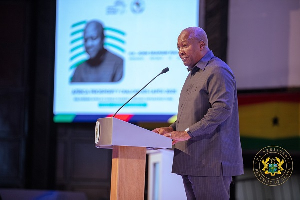J. H. MENSAH, Esq.
M.P. – Sunyani East
P.O. BOX CT 2517
Cantonments – Accra
17 August, 2007
Dear Sir,
ON THE FUTURE OF THE AGRICULTURAL DEVELOPMENT BANK
1. Since the matter of the “sale” of the Agricultural Development Bank broke into the public domain, the debate on it has been orchestrated into a huge political and emotional drama. It is not difficult to trace some of the interests which are at work stoking up the agitation: passions of fear and nationalism been fanned into what is now a raging political campaign, mobilizing various social groups to oppose “the sale of our ADB to foreign interests”. It is not possible for me to participate in the arguments on all the media channels which have engaged with the subject; but from what I have heard and read I think it is necessary to offer some additional thoughts on the matter before we are all swept into the wrong policy conclusions by the emotional maelstrom.
2. Policy issues in the management of our economy should not be settled in an atmosphere of pressure and agitation. It is particularly dangerous that now some TUC officials are trying to influence government policy under the threat of industrial action. This is surely an abuse of the most basic principles of trade unionism. There is no disagreement on matters of industrial relations at issue between the TUC and the government of Ghana. And members of the labour movement are entitled to take individual positions on matters such as the future of a publicly owned bank. But in an emerging democracy the management of public affairs by an elected government should not be coerced by wanton threats of economic disruption by organized labour. This is a dangerous precedent to set for Ghana’s democratic governance.
3. Not to be outdone, the NDC has jumped into the fray with a threat to undo the present government’s decision on this matter when they come into office - whenever that might be! - in response to “public opinion”. Surely, if it is to live up to its role as the alternative government, then the NDC should do its own informed thinking on such issues, and seek to lead public opinion, rather than just jump on the band-wagon of an emotional spasm engineered by obvious vested interests. Like the NPP, leaders of the NDC should address their thinking towards the interests, not of this or that minority group, but of the deprived majority of Ghana’s rural/agricultural population in order to arrive at correct and beneficial conclusions.
4. The first thing to notice about this debate is that what is at stake is not a simple “sale’ of the Agricultural Development Bank. What is at stake, and what is desperately required in the interests of the farming community and the operators of small and medium-scale industry throughout Ghana, is a “re-organization” of the Bank so that it will have more strength to serve them. Whatever the achievements of the ADB in the past 50 years, it is manifest that today, with a net worth of just US$66 million, it is in no position to cater adequately for the urgent need to modernize and re-equip Ghanaian agriculture. That need for agricultural transformation was the sole purpose for establishing the ADB with state resources. And indeed most of those resources were being contributed by these same farmers and self-employed entrepreneurs: so it was also a matter of equity to extend to them the benefits of the nation’s financial system. The purpose of establishing the ADB was not to make profits, however high, out of commercial high-street banking - nor out of the new-fangled trade in money transfer: it was to develop agriculture.
5. Let me re-emphasise the absolutely critical importance of this mandate of the ADB. Every informed observer knows that without a substantial improvement in the productivity of our farmers and self-employed businessmen and women, which would lead to a commensurate improvement in their incomes and conditions of living - Ghana’s economic ambitions are worth nothing. And those ambitions envisage not just improving their living conditions a bit but bringing them all the way up to middle-income status
6. For the purposes of an agrarian transformation, Ghana’s rural majority of subsistence farmers need to be equipped with tools and technology far superior to the present cutlass and hoe technology. The traditional high-street banks have always shied away from providing long-term capital for the purpose of improving agricultural productivity. This is because of their extremely discouraging assessment of the riskiness of agricultural and rural/small-scale lending in Ghana. Being locked into the classic tenets of prudent banking, it was clear that they could not be relied upon to support agricultural investment in the volume required or on terms that farmers could afford. It was to compensate for this lack of access by the rural majority of Ghanaian citizens to the existing credit and other financial services that it was decided to use the resources of the State and of the Bank of Ghana to establish the ADB.
7. From the point of view of transforming Ghana’s agriculture, there is no particular merit in retaining the institution in the hands of government, as some argue. What is important is that the ADB should have access to enough financial resources to fulfil its all-important mandate. The argument that some of the agitators are using to mislead people is that the government and BOG should continue to own the shares of ADB, as part of our heritage. This is really a weak marginal issue. The interests of Ghanaian farmers can be well protected without public ownership of the ADB.
8. The Government has agreed for the Bank of Ghana to offer to a strategic investor its stake in the ADB, amounting to 48% of the total shareholding. That transaction would serve two purposes: first, it would take the BOG out of commercial banking and, secondly, it would open the way to the mobilization of enough financial resources so that we can assist the majority of Ghanaian farmers, millions of them, who are today totally excluded from the help of the nation’s financial services. It is disappointing that so many of the commentators who are insisting on continued state ownership of ADB have studiously averted their attention from the ability of the bank to service its constituency, which should be the main criterion in deciding the policy issue.
9. A divestiture of the ADB is in any case necessary to resolve a legal anomaly which can amount to a conflict of interest. The Bank of Ghana is the supervisor and regulator of all banking institutions in Ghana. It is therefore anomalous that it should also be a major shareholder in a bank such as ADB which it is supposed to regulate and keep well-behaved. But Government and the Bank of Ghana would not be making optimum use of this opportunity of a divestiture if they simply “sold” the BOG stake to some other shareholders. Such a sale would only entitle the new owners to the dividends which ADB can pay, based on its present level of operation and profits. It would add nothing to the capacity of the bank to help our farmers. And from that point of view it is irrelevant whether these new shareholders are recruited through the stock exchange or from farmers’ groups, or any of the other share sale solutions that are being canvassed in this highly manipulated debate.
10. In disposing of the shares of the Bank of Ghana, as should happen in any useful and sophisticated corporate reorganization, the opportunity has to be seized to strengthen and improve the nation-building capacity and operational efficiency of the ADB. That is why it is so misleading to bandy around such misleading and emotive slogans like “government is selling our bank to foreigners”
11. It is significant that the agitation against the disposal of the Bank of Ghana’s shares was launched even before negotiations on the detailed terms of such a reorganization had started. And so when the ADB staff associations came out against the arrangement, whose details and terms had not yet been negotiated, let alone finalised, what were they really agitating against? How could they know whether the arrangement would benefit our farmers or not? It is obvious that they could not be agitating against a reorganisation which could strengthen the ADB and improve its capacity to serve the farmers. They were simply agitating against any change that could threaten their own positions and career interests.
12. It is equally obvious that when the TUC joined in the fray against the disposal of the Bank of Ghana’s shares, they too were only protesting against any changes that might lead to the loss of some peoples’ jobs and positions. It is particularly regrettable that the TUC leaders’ position showed such a grievous lack of attention to the most common contemporary practice in such situations of company reorganization. One of the principal matters that are routinely negotiated in every such process, is precisely the treatment of the existing workers in the enterprise. It is surprising therefore that, without waiting to see the terms of the arrangement in this regard, and instead of offering any constructive suggestions on that aspect of the prospective agreement, senior Trade Union leaders should just come out with a blanket opposition to the whole idea of re-organizing the bank. Surely, the economic policy arm of the Ghana TUC is much more sophisticated than this?
13. Today, the farmers and operators of small and medium-scale enterprises in Ghana will be numbering close to ten million people. The necessary implication of our national ambition to rescue Ghana out of Third World status and bring her into Middle-Income status is that all these people should be equipped and empowered to earn some three to four times more money than their present average incomes. And this they can only do through dramatic increases in their productivity. The soft-ware of this empowerment consists of their education and training, for which the state will carry most of the responsibility. But the hardware, which must go with that human capital, will consist of new farming equipment, new shops and workshops, better transport and other service facilities, as well as all those investments in the quality of life within their own households which will make them more productive, healthier and more dependable workers.
14. To be equal to its mission as conceived more than 40 years ago, the ADB should have at its disposal today not $66 million of net worth but upwards to $250 million. At its rate of growth as witnessed in recent years, the ADB will not attain that stature for decades to come. That is why an injection of major new financial resources from elsewhere is so urgently required. Unlike former years, the government is not in a position to find all those additional resources. Neither is it necessary for it to do so because, as the economic climate here has improved, some of the previously reluctant private banking institutions have now become more willing to channel resources into Ghana’s agriculture and small-scale business development. This is precisely the moment to take advantage of the foresight and initiative of the founding fathers instead of remaining frozen in the structures and the mentality of the past. To block a reorganization of the ADB, with its established network and connections, on the basis of an emotional reaction, without even waiting for details of the proposed new arrangement to be negotiated, is surely a disservice to the nation’s farmers and to the cause of rational policy-making.
15. It may interest your readers to know that once the Bank of Ghana offered its stake in the ADB for sale, and invited proposals from potential partners who could help to put the bank on a new level of effectiveness, offers of such strategic partnership have been received not only from Stanbic, which is the whipping-boy of the present agitation, but from other institutions including some financial institutions here in Ghana. With all due respect to those savants who are advocating a sale of the Bank of Ghana’s stake in the ADB by means of an offering on the Ghana Stock Exchange, let us point out that such a solution would not achieve the purposes of a strategic reorganization. What we should be focusing on instead is how additional resources, which are so sorely needed for lending to agriculture and small-scale industry, could also be raised by the sale of newly-issued shares in ADB to Ghanaian investors on the Exchange. And that can be the more easily done once the attractiveness of the ADB has been reinforced through a strategic reorganization.
16. Some of our colleagues in the NDC and TUC who are trained economists and bankers should also have been pointing out to the public that once the ADB has acquired a resourceful partner, it is only then, that government’s own shareholding in the bank will gain in market value. At that stage it would be profitable for the government to off-load some of that stake with maximum benefit to the exchequer. Let me urge all believers in the private-enterprise-led paradigm of national development, to which at least the NPP is firmly committed among Ghana’s political parties, not to be swayed by the emotional atmosphere which has been whipped up over this matter of the re-organisation of the ADB They should steadfastly stand behind the government and the Bank of Ghana in carrying out the most rational programme of divestiture and empowerment, of the ADB to the benefit of Ghana’s farmers and small-scale entrepreneurs.
17. The last misplaced argument which has been put forward by the opponents of change is that any potential strategic investors in Ghana’s agricultural sector should be encouraged to set up new banking institutions with their own branch networks, parallel to that of the ADB, rather than seeking to operate through the established network of that bank. Surely if, instead of continuing to lend to our farmers the volume of credit which is presently available through each branch of the ADB today, we could funnel through them four to five times that amount of credit then there would be a huge saving in the cost of administering that credit. Increased lending per branch would enhance the productivity of the present ADB staff, and make it more likely that the bank would need more rather than fewer employees. Has the Staff Association, especially at middle management level, really assessed its own interest with sufficient care?. Bigger financial throughout would also enable the ADB to reduce its charges to customers.
18. In every such situation of corporate reorganization there will be that 5-7% of incompetent, non-performing, staff who should rightly be afraid of losing their sinecures in the glare of a thorough process of due diligence. As argued above, a bigger, stronger ADB will need not fewer but more employees. Yet it is so easy for the threatened minority of non-performers who may be weeded out to mobilize the useful majority against beneficial change: and that seems to be happening in the present instance. But what is the national interest in this regard? It is that the deadwood should be cut out and the bank’s customers be better served.
19. Unsurprisingly, the opponents of change at ADB have been able to recruit onto their side a number of “leading farmers” – those who can access credit from the ADB under its present dispensation. But surely, the more important question is this: What about that vast majority of (non-leading) farmers and small-scale businessmen who today cannot access credit owing to the limited resources of the bank? I hope that you in the media will speak up fearlessly for the interests of that majority and not be swept off your feet by emotional, mischievous or self-centred agitation
J.H. MENSAH, MP.
General News of Wednesday, 22 August 2007
Source: j. h. mensah
















